|
|
|
Sort Order |
|
|
|
Items / Page
|
|
|
|
|
|
|
| Srl | Item |
| 1 |
ID:
117967
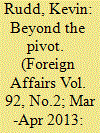

|
|
|
|
|
| Publication |
2013.
|
| Summary/Abstract |
Debate about the future of U.S.-Chinese relations is currently being driven by a more assertive Chinese foreign and security policy over the last decade, the region's reaction to this, and Washington's response -- the "pivot," or "rebalance," to Asia. The Obama administration's renewed focus on the strategic significance of Asia has been entirely appropriate. Without such a move, there was a danger that China, with its hard-line, realist view of international relations, would conclude that an economically exhausted United States was losing its staying power in the Pacific. But now that it is clear that the United States will remain in Asia for the long haul, the time has come for both Washington and Beijing to take stock, look ahead, and reach some long-term conclusions as to what sort of world they want to see beyond the barricades.
|
|
|
|
|
|
|
|
|
|
|
|
|
|
|
|
| 2 |
ID:
117972
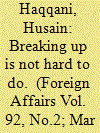

|
|
|
|
|
| Publication |
2013.
|
| Summary/Abstract |
Instead of continuing their endless battling, the United States and Pakistan should acknowledge that their interests simply do not converge enough to make them strong partners. Giving up the fiction of an alliance would free up Washington to explore new ways of achieving its goals in South Asia. And it would allow Islamabad to finally pursue its regional ambitions -- which would either succeed once and for all or, more likely, teach Pakistani officials the limitations of their country's power.
|
|
|
|
|
|
|
|
|
|
|
|
|
|
|
|
| 3 |
ID:
117970
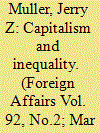

|
|
|
|
|
| Publication |
2013.
|
| Summary/Abstract |
Inequality is rising across the post-industrial capitalist world. The problem is not caused by politics and politics will never be able to eliminate it. But simply ignoring it could generate a populist backlash. Governments must accept that today as ever, inequality and insecurity are the inevitable results of market operations. Their challenge is to find ways of shielding citizens from capitalism's adverse consequences -- even as they preserve the dynamism that produces capitalism's vast economic and cultural benefits in the first place.
|
|
|
|
|
|
|
|
|
|
|
|
|
|
|
|
| 4 |
ID:
117975
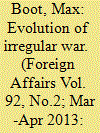

|
|
|
|
|
| Publication |
2013.
|
| Summary/Abstract |
Pundits tend to treat terrorism and guerrilla tactics as something new, but nothing could be further from the truth. Although the agendas have changed over the years -- from tribalism, to liberalism and nationalism, to socialism, to jihadist extremism -- guerrilla and terrorist warfare has been ubiquitous throughout history and consistently deadly.
|
|
|
|
|
|
|
|
|
|
|
|
|
|
|
|
| 5 |
ID:
117969
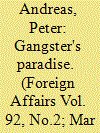

|
|
|
|
|
| Publication |
2013.
|
| Summary/Abstract |
The dark underside of the global economy is thriving. Globalization has been good not only for legitimate businesses but also for those who traffic in illegal drugs, evade sanctions or taxes, trade stolen goods and intellectual property on the black market, smuggle immigrants, and launder money. Some of these activities are merely policing headaches. But others pose major security challenges to governments around the world.
|
|
|
|
|
|
|
|
|
|
|
|
|
|
|
|
| 6 |
ID:
117977
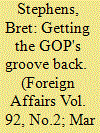

|
|
|
|
|
| Publication |
2013.
|
| Summary/Abstract |
After their loss last year, Republicans are grappling over what to do next -- and when it comes to foreign policy, small-government conservatives worried about debt are squaring off against big-military conservatives fearful of defense cuts. Fortunately, the GOP does not need a total makeover; what it needs is a renegotiated modus vivendi between the two competing camps, each of which has valuable things to teach the other.
|
|
|
|
|
|
|
|
|
|
|
|
|
|
|
|
| 7 |
ID:
117973
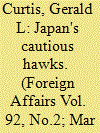

|
|
|
|
|
| Publication |
2013.
|
| Summary/Abstract |
The election of the hawkish Shinzo Abe as Japan's prime minister has the world worrying that Tokyo is about to part with its pacifist strategy of the last 70 years. But Japan's new leaders are pragmatic, and so long as the United States does not waver in its commitment to the country's defense, they are unlikely chart a new course.
|
|
|
|
|
|
|
|
|
|
|
|
|
|
|
|
| 8 |
ID:
117978


|
|
|
|
|
| Publication |
2013.
|
| Summary/Abstract |
Since 1988, Brazilians have cleared more than 153,000 square miles of Amazonian rain forest, devastating the environment and driving global climate change forward ever faster. Recently, however, Brazil has changed its course, reducing the rate of deforestation by 83 percent since 2004. At the same time, it has become a test case for a controversial international climate-change prevention strategy that places a monetary value on the carbon stored in forests.
|
|
|
|
|
|
|
|
|
|
|
|
|
|
|
|
| 9 |
ID:
117968
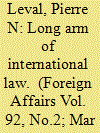

|
|
|
|
|
| Publication |
2013.
|
| Summary/Abstract |
In late 1945, the Allied victors of World War II established a military tribunal in Nuremberg, Germany, which convicted Nazi leaders for their wartime atrocities. The animating principle of the trials was that conduct of extreme inhumanity violated the part of international law that protects fundamental human rights, which applies everywhere, even though the conduct was authorized by German law under the Third Reich. Since then, the world has accepted that the worst human rights abuses -- including genocide, slavery, torture, and war crimes -- are crimes prohibited by international law, even if they are expressly permitted by the laws of the state in which they occur.
|
|
|
|
|
|
|
|
|
|
|
|
|
|
|
|
| 10 |
ID:
117974
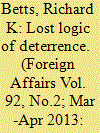

|
|
|
|
|
| Publication |
2013.
|
| Summary/Abstract |
For half a century, deterrence was the backbone of U.S. national security strategy. But now, Washington doesn't seem to know how and when to use it properly. The United States has needlessly applied deterrence to Russia, failed to apply it when it should have against Iraq and Iran, and been dangerously confused about whether to apply it to China. U.S. policymakers need to relearn the basics of deterrence in order to apply it successfully in the appropriate circumstances.
|
|
|
|
|
|
|
|
|
|
|
|
|
|
|
|
| 11 |
ID:
117971


|
|
|
|
|
| Publication |
2013.
|
| Summary/Abstract |
Even as Mexico continues to struggle with grave security threats, its steady rise is transforming the country's economy, society, and political system. Given the Mexico's bright future and the interests it shares with the United States in energy, manufacturing, and security, Washington needs to start seeing its southern neighbor as a partner instead of a problem.
|
|
|
|
|
|
|
|
|
|
|
|
|
|
|
|
| 12 |
ID:
117979
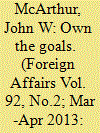

|
|
|
|
|
| Publication |
2013.
|
| Summary/Abstract |
Since their inception in 2000, The Millennium Development Goals have revolutionized the global aid business, using specific targets to help mobilize and guide development efforts. They have encouraged world leaders to tackle multiple dimensions of poverty simultaneously and provided a standard for judging performance. As their 2015 expiration looms, the time has come to bank those successes and focus on what comes next.
|
|
|
|
|
|
|
|
|
|
|
|
|
|
|
|
| 13 |
ID:
117976


|
|
|
|
|
| Publication |
2013.
|
| Summary/Abstract |
U.S. Treasury official Harry Dexter White is best known as one of the leading architects of the Bretton Woods system that shaped the global economy after World War II. But he was also a spy for the Soviet Union, providing secret information and giving advice on economic issues. Why did he do it? Newly uncovered documents show that this champion of postwar global capitalism was actually a passionate believer in the success of the Soviet experiment with socialism.
|
|
|
|
|
|
|
|
|
|
|
|
|
|
|
|
|
|
|
|
|